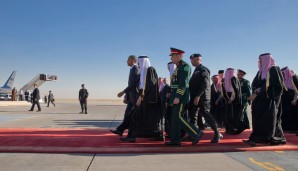
 When historians look back on the current era, I doubt that they will call it the American Century or the Triumph of the EUnion or the Rise of China or the Fall of Russia. I think they will call it the Age of Saud.
When historians look back on the current era, I doubt that they will call it the American Century or the Triumph of the EUnion or the Rise of China or the Fall of Russia. I think they will call it the Age of Saud.
If you squint your eyes and look at the big, big picture, Saudi Arabia has been the center point of geopolitics since 1973 – arguably the end of the short American Half-Century. The oil shocks of the 1970’s, the rise of Jihadism in the 1980’s, the Gulf War and No Fly Zones in the 1990’s, the Terrorist acts of the 2000’s and now the destruction of the Non-Saudi Oil Industry in the 2010’s. The Saudis have been calling the tune for the past 50 years. America, Russia and Europe have reacted to these events as best they could, but in the end, the West has been a dependent variable, not an independent variable, in these equations.
If you think that this world view is an exaggeration, look at the list of American politicians who journeyed to Riyadh in January 2015 to pay their condolences to the new Saudi King, Salman upon the death of King Abdullah.
• President Barack Obama
• Senator John McCain of Arizona
• Former Secretary of State, James A. Baker III
• Former Secretary of State, Condoleezza Rice.
• Former National Security Adviser, Brent Scowcroft
• Former National Security Adviser, Stephen J. Hadley
• Former National Security Adviser, Samuel Berger
• Secretary of State, John Kerry
• Then National Security Adviser and former Ambassador to the United Nations, Susan E. Rice
• Director of the CIA, John O. Brennan
• Gen. Lloyd J. Austin III, who oversees Middle East operations
• Senator Mark Warner of Virginia
• Minority Leader of the House, Nancy Pelosi
• Representative Ami Bera of California. I can’t figure out why he was there.
• Representative Eliot L. Engel who represents the Congressional District next to mine, in southern Westchester County, New York. He is Ranking Democratic Member on the House Foreign Affairs Committee. He also serves on the Energy and Commerce Committee including the Subcommittee on Health, and the Subcommittee on Energy and Power. He is the founder and Co-Chair of the House Oil and National Security Caucus. He is also a member of the Democratic Task Force on Health and serves on Commission on Human Rights.
• Representative Joseph Crowley of New York. He is Vice Chair of the Democratic Caucus, the fifth-highest ranking position in House Democratic Leadership. His cousin, a firefighter, was killed in the 9/11 attack.
America’s unholy dependency on Saudi Arabia can and needs to be broken, if stability is going to be restored in the Middle East. But how?
I have a few ideas and have written about them over the years.
Oil independence is the key to dis-entanglement from Saudi influence. This was starting to happen until last summer when the Saudis decided to crater world oil pricing as a means of driving North American non-conventional oil producers out of the market –another act of aggression from our dear and precious ally. Saudi Arabia has publically stated that their goal is to put American tight oil (read frackers) and oil sands producers out of business. The Saudis also want to nip Arctic Oil in the bud. To do this the Saudis have guided oil prices down by 50% to below the marginal cost of producing oil from tight formations, oil sands or in the harsh conditions in the Arctic. Their strategy is starting to work with North American oil production dropping for the first time in about five years.
As I have written many times, the answer is to regulate the price of crude oil imports – put tariffs on crude oil imports. The American government should set the price of crude oil entering the country at $100 per barrel. At that price, non-conventional oil, oil sands and the Arctic fields are economically viable. At that price, alternative energy sources like wind and solar are viable. At $100 per barrel, America can achieve energy independence.
In addition, $100 oil is consistent with the imperative to mitigate climate change by reducing carbon emissions. More expensive oil will accelerate the shift to an electric economy which is much more climate friendly than an oil economy.
The proceeds from the crude oil tariff could be used to construct carbon sequestration facilities. Such facilities would take carbon dioxide out of the atmosphere and put carbon back underground where it belongs if the carbon dioxide levels are to be returned to historical levels of 315 parts per million, from the current 400 parts per million.
Once energy independence has been achieved, America can take more foreign policy risk and contain Saudi power.

Leave Your Comments